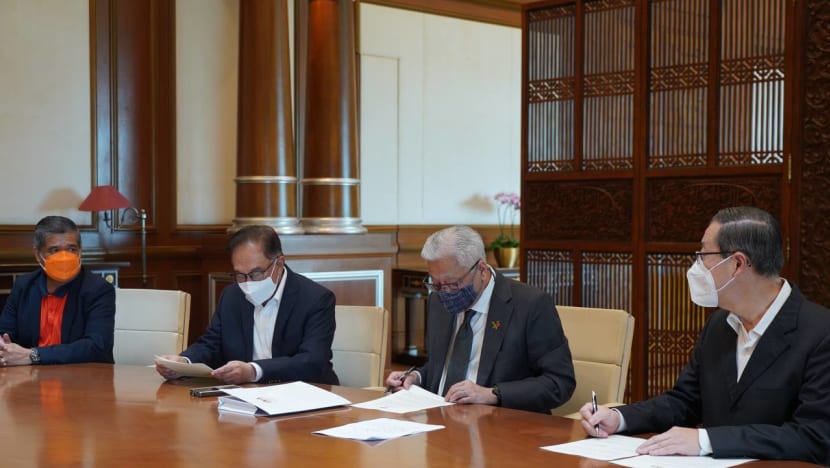Pakatan Harapan 'inclined to accept' Malaysia PM Ismail Sabri's offer of parliamentary reforms
12 September, 2021

The Pakatan Harapan (PH) opposition coalition has stated that it is “inclined to accept” an offer by Malaysian Prime Minister Ismail Sabri Yaakob to carry out parliamentary reforms.
In a joint statement on Saturday night (Sep 11), the coalition’s presidential council wrote: “Pakatan Harapan is inclined to accept the memorandum of understanding to save lives and livelihoods of the people, subject to improvements to the draft which needs to be refined by representatives of both sides before it can be finalised.”
“Let us synergise our strengths to tackle the COVID-19 pandemic and overcome the economic recession that has hit our country,” it added.
The statement was jointly issued by Mr Anwar Ibrahim, who leads Parti Keadilan Rakyat (PKR), together with Mr Lim Guan Eng and Mr Mohamad Sabu from the Democratic Action Party (DAP) and Parti Amanah Negara respectively.
On Friday, the prime minister issued a statement saying that the Cabinet has agreed to offer to implement a number of parliamentary and government administration transformations, ahead of a parliamentary sitting on Monday.
The package includes presenting an Anti-Party Hopping Bill, which, if passed, would prevent politicians elected on one party's platform from defecting to another party.
Political defections of this nature resulted in the fall of the PH government in February 2020, when a number of MPs from PKR, as well as almost all Parti Pribumi Bersatu Malaysia (PPBM) lawmakers, pulled out of the-then ruling coalition.
Defections by state assemblymen from PH to Perikatan Nasional (PN) also led to the state governments collapsing in Johor, Perak, Melaka and Kedah.
Other proposals in Mr Ismail Sabri’s Friday statement included ensuring equal membership in parliamentary special committees, involving both government and opposition parliamentarians.
In addition, the parliamentary Opposition Leader will be remunerated and given amenities equivalent to a minister.
He also proposed that a prime minister’s term should be limited to 10 years via a constitutional amendment, as well as implementing “Undi 18”, the constitutional amendment allowing 18-year-olds to vote and stand for elections in the near future.
In its statement on Saturday, PH’s presidential council said its decision was made following an initial meeting the three opposition leaders held with Mr Ismail Sabri on Aug 25, and another meeting between the two parties on Sep 10.
The statement added that Friday’s meeting saw the discussion of a number of key matters and specific programmes, with an emphasis on reforms in both the economy and public health sectors to manage the COVID-19 pandemic.
"Aside from that, the issue of parliamentary proceedings, the question of legitimacy and matters of improvements to the government administration were also discussed," PH stated.
The three opposition leaders also outlined that ahead of the upcoming annual national budget, there needs to be an additional fiscal injection of RM45 billion (US$10.87 billion) to the country’s COVID-19 fund.
They added that presently, only RM8.9 billion was left in the RM65 billion fund to handle the pandemic and extend financial help to the people.
The statement by the opposition added that the two sides also discussed political reforms that must be incorporated into the memorandum, such as implementing Undi 18 and the independence of the judiciary.
“Representatives also discussed the issue of vote of confidence as well as the mechanism for monitoring the implementation of the reforms,” it added.
Mr Ismail Sabri enjoys a slim parliamentary majority of 114 MPs out of 220 lawmakers in the Lower House. There have been calls for a confidence motion in next week’s parliamentary sitting, but it has so far not been included in the meeting agenda.
The offer made by Mr Ismail Sabri is similar to that made by his predecessor Muhyiddin Yassin nearly a month ago, when he sought bipartisan support in parliament’s Lower House to survive an impending confidence vote.
In a televised address, Mr Muhyiddin had promised that if he received two-thirds support in the House, he would push through parliamentary reforms.
Mr Muhyiddin was then facing a confidence crisis after the president of the United Malays National Organisation (UMNO), Ahmad Zahid Hamidi, announced he had gathered enough statutory declarations from party MPs stating they had withdrawn their support for Mr Muhyiddin.
However, the offer was rejected by PH as well as UMNO. Other opposition parties such as former prime minister Dr Mahathir Mohamad's Parti Pejuang TanahAir, also rejected the offer, resulting in Mr Muhyiddin's resignation on Aug 16.
Source: www.channelnewsasia.com
TAG(s):
